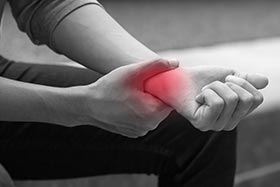What does having hot or warm joints mean?
A ‘hot’ or warm feeling around joints is usually a sign of inflammation. It is associated with joint injuries and a range of medical conditions, including arthritis, gout and Lyme disease.

Joint that are hot to the touch can be a sign of either a short-term injury that requires treatment or a long-term chronic condition.
Tissue damage and fractures
- A strain or sprain
- Damage to muscles or tendons (e.g. Tennis Elbow)
- Tendon sheath inflammation
- A torn ligament
- Damage to the bursae (sacs that lubricate your joints)
All of these injuries can cause inflammation, which leads to warm joints. These injuries are most often found in the hands, feet and wrists, with people who perform repetitive physical activities particularly at risk. In the workplace, typing or using a tool could be a cause; when exercising, jogging or playing a racquet sport could be responsible.
Warming can also be caused by inflammation from more serious injuries, including fractures, dislocation, infection or bleeding into the joint.
Treatment and relief
In some cases, it is possible to resolve the underlying issue that is causing the hot sensation – for example, bursitis might be treated using antibiotics.
However, changes in lifestyle and diet may help to provide relief from the symptoms.
If you have been diagnosed with an inflammation-causing illness such as arthritis, you might want to consider including in your diet foods rich in anti-inflammatory nutrients:
- Oily fish such as mackerel, sardines and salmon, contain omega-3 fatty acids, which have been shown to affect inflammation.
- Fruits, especially cherries and citrus fruits, are packed with vitamin C and polyphenols, well studied anti-inflammatory nutrients.
- Peppers are also rich in vitamin C. Moreover, chilli peppers contain capsaicin, an analgesic often used as an arthritis treatment.
- Capsaicin, taken from chilli peppers, is an analgesic often used as an arthritis treatment.
- Dark leafy vegetables such as broccoli and spinach are packed with antioxidants, which can protect cells from inflammation.
Other natural ingredients to consider include spirulina, green tea and ginger.
Long-term illnesses
Warm or hot joints can also be a symptom of various chronic illnesses:
- Arthritis: common forms of this illness, including rheumatoid arthritis, are well known for causing warm joints.
- Gout: a buildup of uric acid in the joints – usually in the feet – can cause serious pain and warm joints.
- Lyme disease: the late stages of this tick-borne bacterial illness can include joint pain, even after the bacteria are dead.
- Rheumatic fever: this illness is a complication of strep throat which can cause hot, swollen joints
If you suspect that you might have one of these conditions, you should consult your doctor immediately. Beginning a course of treatment quickly might help to prevent further joint damage.
There are also various treatments available to provide relief from the joint pain and heat caused by these conditions.
